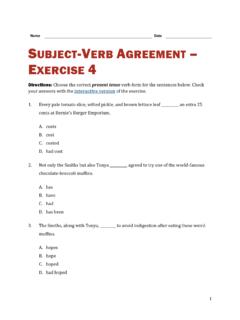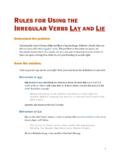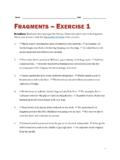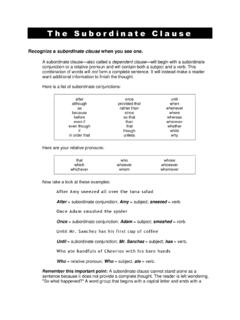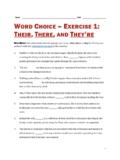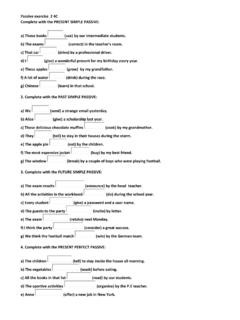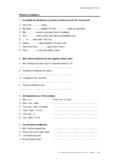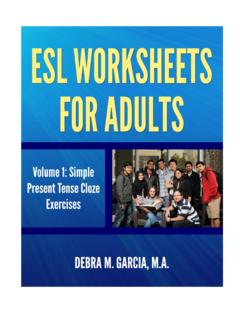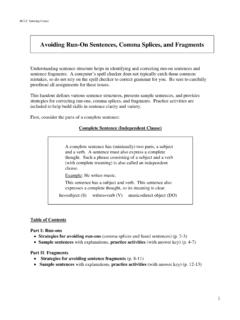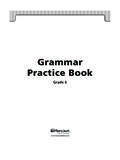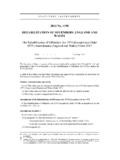Transcription of Rules for Using Irregular Verbs
1 Rules FOR Using Irregular . Verbs . Understand the problem. All Verbs , whether regular or Irregular , have five forms [often called principal parts]. These forms are the infinitive, simple present, simple past, past participle, and present participle. The difference between a regular and an Irregular verb is the formation of the simple past and past participle. Regular Verbs are dependably consistent the simple past ends in ed as does the past participle. Check out this chart: SIMPLE S I M P LE PAST PRESENT. INFINITIVE. PRESENT PAST P A R T I C I P LE P A R T I C I P LE. to laugh laugh(s) laughed laughed laughing to start start(s) started started starting to wash wash(es) washed washed washing to wink wink(s) winked winked winking In contrast, the simple past and past participle of Irregular Verbs can end in a variety of ways, with absolutely no consistent pattern.
2 Here are some examples: SIMPLE S I M P LE PAST PRESENT. INFINITIVE. PRESENT PAST P A R T I C I P LE P A R T I C I P LE. to drive drive(s) drove driven driving to feel feel(s) felt felt feeling 1. to put put(s) put put putting to swim swim(s) swam swum swimming Writers make two frequent errors with Irregular Verbs . They either add an incorrect ed to the end of an Irregular verb or accidentally interchange the simple past and past participle. Read this sentence: Olivia feeled like exercising yesterday, so she putted on her bathing suit and drived to the YMCA, where she swum so far that only an extra large pepperoni pizza would satis fy her hunger.
3 What are the problems with this sentence? First, feeled should be felt. Next, putted needs to be put. The correct past tense of drive is drove. And we must change swum to swam. Know the solution. To avoid making mistakes with Irregular Verbs , learn the very long chart below. SIMPLE S I M P LE PAST PRESENT. INFINITIVE. PRESENT PAST P A R T I C I P LE P A R T I C I P LE. to arise arise(s) arose arisen arising awoke or awaked or to awake awake(s) awaking awaked awoken to be am, is, are was, were been being borne or to bear bear(s) bore bearing born to beat beat(s) beat beaten beating to become become(s) became become becoming to begin begin(s) began begun beginning 2.
4 SIMPLE S I M P LE PAST PRESENT. INFINITIVE. PRESENT PAST P A R T I C I P LE P A R T I C I P LE. to bend bend(s) bent bent bending to bet bet(s) bet bet betting to bid [to bid(s) bid bid bidding offer]. to bid [to bid(s) bade bidden bidding command]. to bind bind(s) bound bound binding to bite bite(s) bit bitten or bit biting to blow blow(s) blew blown blowing to break break(s) broke broken breaking to bring bring(s) brought brought bringing to build build(s) built built building to burst burst(s) burst burst bursting to buy buy(s) bought bought buying to cast cast(s) cast cast casting to catch catch(es) caught caught catching to choose choose(s) chose chosen choosing to cling cling(s) clung clung clinging to come come(s) came come coming to cost cost(s) cost cost costing to creep creep(s) crept crept creeping to cut cut(s) cut cut cutting 3.
5 SIMPLE S I M P LE PAST PRESENT. INFINITIVE. PRESENT PAST P A R T I C I P LE P A R T I C I P LE. to deal deal(s) dealt dealt dealing to dig dig(s) dug dug digging dived or to dive dive(s) dived diving dove to do do(es) did done doing to draw draw(s) drew drawn drawing dreamed or dreamed or to dream dream(s) dreaming dreamt dreamt to drink drink(s) drank drunk drinking to drive drive(s) drove driven driving to eat eat(s) ate eaten eating to fall fall(s) fell fallen falling to feed feed(s) fed fed feeding to feel feel(s) felt felt feeling to fight fight(s) fought fought fighting to find find(s) found found finding to flee flee(s) fled fled fleeing to fling fling(s)
6 Flung flung flinging to fly flies, fly flew flown flying forbade or to forbid forbid(s) forbidden forbidding forbad 4. SIMPLE S I M P LE PAST PRESENT. INFINITIVE. PRESENT PAST P A R T I C I P LE P A R T I C I P LE. forgotten or to forget forget(s) forgot forgetting forgot to forgive forgive(s) forgave forgiven forgiving to forsake forsake(s) forsook forsaken forsaking to freeze freeze(s) froze frozen freezing got or to get get(s) got getting gotten to give give(s) gave given giving to go go(es) went gone going to grow grow(s) grew grown growing to hang [to hang(s) hung hung hanging suspend]. to have has, have had had having to hear hear(s) heard heard hearing to hide hide(s) hid hidden hiding to hit hit(s) hit hit hitting to hurt hurt(s) hurt hurt hurting to keep keep(s) kept kept keeping to know know(s) knew known knowing to lay lay(s) laid laid laying to lead lead(s) led led leading 5.
7 SIMPLE S I M P LE PAST PRESENT. INFINITIVE. PRESENT PAST P A R T I C I P LE P A R T I C I P LE. leaped or leaped or to leap leap(s) leaping leapt leapt to leave leave(s) left left leaving to lend lend(s) lent lent lending to let let(s) let let letting to lie [to rest lie(s) lay lain lying or recline]. to light light(s) lighted or lit lighted or lit lighting to lose lose(s) lost lost losing to make make(s) made made making to mean mean(s) meant meant meaning to pay pay(s) paid paid paying proved or to prove prove(s) proved proving proven to quit quit(s) quit quit quitting to read read(s) read read reading to rid rid(s) rid rid ridding to ride ride(s) rode ridden riding to ring ring(s) rang rung ringing to rise rise(s) rose risen rising to run run(s) ran run running to say say(s) said said saying 6.
8 SIMPLE S I M P LE PAST PRESENT. INFINITIVE. PRESENT PAST P A R T I C I P LE P A R T I C I P LE. to see see(s) saw seen seeing to seek seek(s) sought sought seeking to send send(s) sent sent sending to set set(s) set set setting to shake shake(s) shook shaken shaking to shine [to shine(s) shone shone shining glow]. to shoot shoot(s) shot shot shooting shown or to show show(s) showed showing showed to shrink shrink(s) shrank shrunk shrinking to sing sing(s) sang sung singing sank or to sink sink(s) sunk sinking sunk to sit sit(s) sat sat sitting to slay slay(s) slew slain slaying to sleep sleep(s) slept slept sleeping to sling sling(s) slung slung slinging sneaked or sneaked or to sneak sneak(s) sneaking snuck snuck to speak speak(s) spoke spoken speaking to spend spend(s) spent spent spending 7.
9 SIMPLE S I M P LE PAST PRESENT. INFINITIVE. PRESENT PAST P A R T I C I P LE P A R T I C I P LE. to spin spin(s) spun spun spinning sprang or to spring spring(s) sprung springing sprung to stand stand(s) stood stood standing to steal steal(s) stole stolen stealing to sting sting(s) stung stung stinging stank or to stink stink(s) stunk stinking stunk to stride stride(s) strode stridden striding to strike strike(s) struck struck striking to strive strive(s) strove striven striving to swear swear(s) swore sworn swearing to sweep sweep(s) swept swept sweeping to swim swim(s) swam swum swimming to swing swing(s) swung swung swinging to take take(s) took taken taking to teach teach(es)
10 Taught taught teaching to tear tear(s) tore torn tearing to tell tell(s) told told telling to think think(s) thought thought thinking to throw throw(s) threw thrown throwing to understand understand(s) understood understood understanding 8. SIMPLE PAST PRESENT. INFINITIVE S I M P LE P A S T. PRESENT P A R T I C I P LE P A R T I C I P LE. woke or waked or to wake wake(s) waking waked woken to wear wear(s) wore worn wearing wove or woven or to weave weave(s) weaving weaved wove to weep weep(s) wept wept weeping to wring wring(s) wrung wrung wringing to write write(s) wrote written writing Know the difference between the simple past tense and the past participle.
